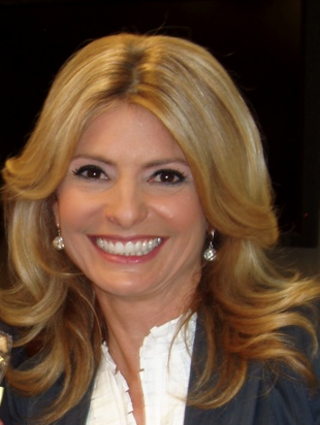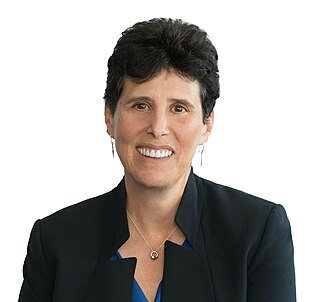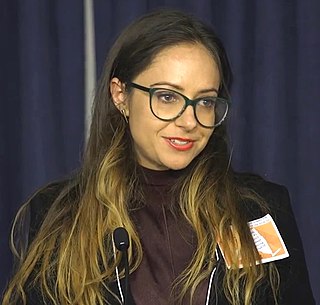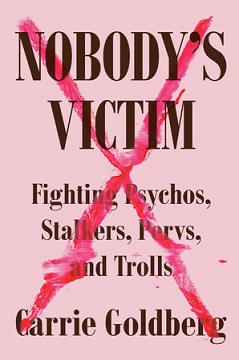Related Research Articles

Sexual harassment is a type of harassment involving the use of explicit or implicit sexual overtones, including the unwelcome and inappropriate promises of rewards in exchange for sexual favors. Sexual harassment can be physical and/or verbal. Sexual harassment includes a range of actions from verbal transgressions to sexual abuse or assault. Harassment can occur in many different social settings such as the workplace, the home, school, or religious institutions. Harassers or victims can be of any gender.

A ripple effect occurs when an initial disturbance to a system propagates outward to disturb an increasingly larger portion of the system, like ripples expanding across the water when an object is dropped into it.

Harvey Weinstein is an American former film producer and convicted sex offender.

Lisa Read Bloom is an American attorney known for advising Harvey Weinstein amid various sexual abuse allegations, and for representing women whose sexual harassment claims precipitated the firing of Bill O'Reilly from Fox News.

In October 2017, The New York Times and The New Yorker reported that dozens of women had accused film producer Harvey Weinstein of rape, sexual assault and sexual abuse over a period of at least 30 years. Over 80 women in the film industry eventually accused Weinstein of such acts. Weinstein himself denied "any non-consensual sex". Shortly after, he was dismissed from The Weinstein Company (TWC), expelled from the Academy of Motion Picture Arts and Sciences and other professional associations, and retired from public view.

#MeToo is a social movement and awareness campaign against sexual abuse, sexual harassment, and rape culture, in which people publicize their experiences of sexual abuse or sexual harassment. The phrase "Me Too" was initially used in this context on social media in 2006, on Myspace, by sexual assault survivor and activist Tarana Burke. The hashtag #MeToo was used starting in 2017 as a way to draw attention to the magnitude of the problem.
The Weinstein effect is a global trend in which allegations of sexual misconduct by famous or powerful figures are disclosed. The first of a worldwide wave of allegations were made in the United States in October 2017, when media outlets reported on the allegations made against film producer Harvey Weinstein. They were described as a "tipping point" or "watershed moment" and precipitated an "international reckoning" against sexual harassment.

Time's Up is a non-profit organization that raises money to support victims of sexual harassment. The organization was founded on January 1, 2018, by Hollywood celebrities in response to the Weinstein effect and the Me Too movement. As of January 2020, the organization had raised $24 million in donations.

Debra S. Katz is an American civil rights and employment lawyer and a founding partner of Katz Banks Kumin in Washington, D.C. She is best known for representing alleged victims of sexual assault and sexual harassment, notably Dr. Christine Blasey Ford, Vanessa Tyson, Chloe Caras, and accusers of Congressmen Pat Meehan and Eric Massa, and whistleblowers facing retaliation, including most recently Dr. Rick Bright. Katz's primary practice areas at her firm are employment and whistleblower law, where she represents victims of workplace discrimination and retaliation.
Shitty Media Men was a crowdsourced Google spreadsheet created in October 2017 that collected allegations and rumors of sexual misconduct by about 70 men in the media industry, particularly in New York City. Moira Donegan, a former assistant editor at The New Republic, initially began the spreadsheet online anonymously.
There have been many reported cases and accusations of sexual abuse in the American film industry reported against people related to the medium of cinema of the United States.
Zoë Brock is a model and writer from New Zealand.

Carrie Goldberg is an American lawyer specializing in sex crimes with her law firm C.A. Goldberg PLLC. She has represented: five clients who described sexual abuse committed by Harvey Weinstein; the former Democrat Member of Congress Katie Hill after her naked photos were published in the media; and the author Emma Cline after an ex-partner sued for plagiarism. Her legal cases with low-profile individuals—involving revenge porn, intimate partner violence and online abuse—often draw national media attention.
The Indian#MeToo movement began in late 2018 to manifest in areas of the Indian society including the government, the media, and the Bollywood film industry. In India, the Me Too movement is seen as either an independent outgrowth influenced by the international campaign against sexual harassment of women in the workplace, or an offshoot of the American "Me Too" social movement. Me Too began gaining prominence in India with the increasing popularity of the international movement, and later gathered sharp momentum in October 2018 in the entertainment industry of Bollywood, centered in Mumbai, when actress Tanushree Dutta accused Nana Patekar of sexual harassment. This led to many women in the news media, Indian films, and even within the government to speak out and bring allegations of sexual harassment against a number of perpetrators.

She Said: Breaking the Sexual Harassment Story That Helped Ignite a Movement is a 2019 nonfiction book written by Jodi Kantor and Megan Twohey, two New York Times investigative reporters who exposed Harvey Weinstein's history of abuse and sexual misconduct against women, a catalyst for the burgeoning MeToo movement. The book was published on September 10, 2019 by Penguin Press.

Catch and Kill: Lies, Spies, and a Conspiracy to Protect Predators is a 2019 book by the American journalist Ronan Farrow. He recounts the challenges he faced chasing the stories of Harvey Weinstein's decades of rape, sexual assault, and sexual abuse of women and the case against him. Farrow argues that Weinstein was able to use Black Cube, a private Israeli intelligence service, to successfully pressure executives at NBC News to kill the story there, leading him to take it to The New Yorker, where it was published and helped spark the international #MeToo movement exposing sexual abuse, mostly of women, in many industries.
The #MeToo movementin Pakistan is modeled after the international #MeToo movement and began in late 2018 in Pakistani society. It has been used as a springboard to stimulate a more inclusive, organic movement, adapted to local settings, and has aimed to reach all sectors, including the lowest rungs of society.
The #MeToo movement emerged in China shortly after it originated in the United States. In mainland China, online MeToo posts were slowed by government censorship. On Weibo, #Metoo and #MetooinChina were both blocked for a period of time. To avoid the censorship, Chinese women using the #MeToo hashtag on social media began using bunny and bowl-of-rice emojis; "rice bunny" is pronounced mi-tu in Chinese. Feminist activist Xiao Qiqi originated the use of rice-bunny emojis for the movement. Another alternative is “River Crab” which indicates censorship. Generally, the #Metoo movement was only accessible to elite women and urban women.
The #MeToo hashtag has trended in at least 85 countries. The campaign has encouraged people around the world to spread their stories of sexual assault. Before the MeToo movement went global, not many imagined that it would have taken off the way it did. The MeToo movement was founded in 2006 by Tarana Burke, an activist and survivor of sexual violence. The published report of a number of sexual allegations against Hollywood producer, Harvey Weinstein stirred up some Hollywood actors to get vocal against sexual harassment and their call for action to support in the fight against sexual violence. The MeToo movement has resonated with many people across all walks of life especially those who have been victims but were afraid to speak out or felt that they would not be heard.

Nobody's Victim: Fighting Psychos, Stalkers, Pervs, and Trolls is a 2019 book by Carrie Goldberg, co-written with Jeannine Amber. It describes incidents of sexual violence experienced by Goldberg's clients and herself, as well as other famous cases. The acts of violence include rape and sexual assault, revenge porn, "doxing", "swatting", "sextortion", and abusive messages. Goldberg categorizes perpetrators as "assholes", "psychos", "pervs" or "trolls" depending on their nature, though "assholes" was omitted in the book's subtitle to avoid profanity.
References
- ↑ "Here's Why So Many Women Knew The Rumors About Harvey Weinstein". BuzzFeed. Retrieved 2018-01-27.
- 1 2 3 4 5 "What is a whisper network? How women are taking down bad men in the #MeToo age". Newsweek. 2017-11-22. Retrieved 2018-01-27.
- 1 2 Creswell, Julie; Hsu, Tiffany (2017-11-04). "Women's Whisper Network Raises Its Voice". The New York Times. ISSN 0362-4331 . Retrieved 2018-01-27.
- ↑ "Women at Yale say they developed a secret way to protect themselves from dangerous men because the school keeps failing them". Business Insider. Retrieved 2018-01-27.
- 1 2 3 "Like It or Not, Lists of 'Shitty Men' Are Going to Keep Circulating". Fortune. Retrieved 2018-01-27.
- ↑ Tolentino, Jia (2017-10-14). "The Whisper Network After Harvey Weinstein and "Shitty Media Men"". The New Yorker. ISSN 0028-792X . Retrieved 2018-01-27.
- 1 2 "The "Shitty Media Men" list, explained". Vox. Retrieved 2018-01-27.
- ↑ Garber, Megan. "The Harper's Controversy: The Whisper Network Meets the Megaphone". The Atlantic. Retrieved 2018-01-27.
- ↑ "What happens when #MeToo comes to Parliament Hill". CBC News. Retrieved 2018-01-27.
- ↑ "Can women experiencing sexual harassment safely take their whisper networks online?". www.newstatesman.com. 11 January 2018. Retrieved 2018-01-27.
- ↑ Chance, Alexei Koseff And Amy (2017-11-28). "'We have rapists in this building': Women say sexual abuse isn't reported at California Capitol". The Sacramento Bee. ISSN 0890-5738 . Retrieved 2018-01-27.
- 1 2 3 Quinlan, Casey (2018-01-13). "The Shitty Media Men list and other ways women can report misconduct". the Guardian. Retrieved 2018-01-27.
- 1 2 3 4 5 "It's time to weaponize the "whisper network"". Vox. Retrieved 2018-01-27.
- ↑ "Whisper Network: a dozen University cases logged in sexual misconduct database". The Michigan Daily. Retrieved 2018-01-27.
- 1 2 Paul, Kari. "These apps help victims of sexual harassment to file anonymous reports". MarketWatch. Retrieved 2018-01-27.
- ↑ Chotiner, Isaac. "How Second-Wave Feminism Inexplicably Became a Villain in the #MeToo Debate". Slate Magazine. Retrieved 2018-01-27.
- ↑ "There is a whisper network in politics. To protect young women, it has to end" . Retrieved 2018-01-27.
- ↑ "How 'whisper networks' help protect women from the Harvey Weinsteins of the world". USA TODAY. Retrieved 2018-01-27.
- ↑ "'They Don't Want to Include Women Like Me.' Sex Workers Say They're Being Left Out of the #MeToo Movement". Time. Retrieved 2018-03-23.